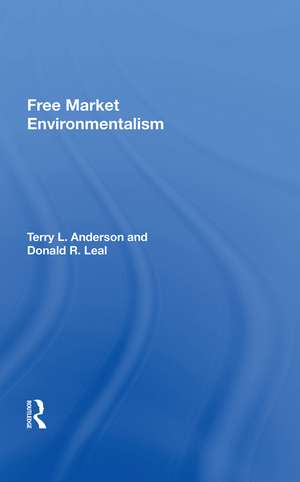Free Market/spec Sale/avail Hard Only
Autor Terry L. Andersonen Limba Engleză Hardback – 23 mai 2019
Preț: 763.39 lei
Preț vechi: 1026.94 lei
-26% Nou
Puncte Express: 1145
Preț estimativ în valută:
146.07€ • 152.92$ • 120.87£
146.07€ • 152.92$ • 120.87£
Carte tipărită la comandă
Livrare economică 05-19 aprilie
Preluare comenzi: 021 569.72.76
Specificații
ISBN-13: 9780367013127
ISBN-10: 0367013126
Pagini: 208
Dimensiuni: 147 x 229 mm
Greutate: 0.41 kg
Ediția:1
Editura: Taylor & Francis
Colecția Routledge
Locul publicării:Oxford, United Kingdom
ISBN-10: 0367013126
Pagini: 208
Dimensiuni: 147 x 229 mm
Greutate: 0.41 kg
Ediția:1
Editura: Taylor & Francis
Colecția Routledge
Locul publicării:Oxford, United Kingdom
Cuprins
Visions of the Environment -- Rethinking the Way we Think -- From Free Grass to Fences -- From Barbed Wire to Red Tape -- Bureaucracy Versus Environment -- Inside Our Outdoor Policy -- Ecology and Energy -- Going with the Flow -- Homesteading the Oceans -- Marketing Garbage -- Tackling the Tougher Problems
Descriere
Although there is in the United States a clear national consensus supporting the protection of the environment, advocates often profoundly disagree about the policies best designed to achieve this end. The traditional answer has been that government must intervene, through legislation and regulation of behavior, to preserve environmental values. This book takes a different approach, examining the prospects (and pitfalls) for improving natural resource allocation and environmental quality through market processes. The authors demonstrate that governmental policies often exacerbate environmental problems because of inadequate incentives and information. A property rights approach that focuses on the costs of operating markets as well as governments lays the framework for thinking about problems ranging from the American Frontier to global warming. Property rights solutions that encourage market processes are proposed for public land management, outdoor recreation, water quantity and quality, and ocean fisheries. The final chapter tackles the “tougher problems” of global warming and acid rain. Free Market Environmentalism applies the economic way of thinking to environmental problems of growing importance. It will be appropriate for environmental economic courses, but an economics background is not a prerequisite for understanding this nontechnical, innovative approach to natural resource management.
